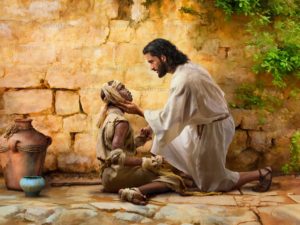In Matthew, Mark, and Luke the temple scene occurs following Jesus’ entry into Jerusalem; however, in John’s Gospel (John 2:13-25) the episode is placed immediately following Jesus’ first “sign” (miracle) in his ministry, the wedding at Cana.
The temple skirmish functions in the
Synoptic Gospels as the final public act whereby the authorities make the
decision to arrest and kill Jesus. We know that the raising of Lazarus serves
as the final act that leads to his arrest. Restoring someone to
life after having been dead frightens and challenges the Chief priests and
Roman authorities and requires that he be removed in order that they stop Jesus
movement and silence his followers.
The incarnation of God in the
world in Jesus underscores our shared intimacy with Jesus’ death,
resurrection and our salvation. So what does this have to do with
Jesus’ visceral reaction to the traffickers in the temple? We know from
our readings of John that his overall mission is to reinforce our
shared divinity with God through Christ and His and our
resurrections. The
Word became flesh and made His dwelling among us. We have seen His glory, the
glory of the one and only Son from the Father, full of grace and truth. John 1:14. So, the commercial desecration of
the temple while an important event in itself is for John, a
metaphorical reference to the real Temple God.
For Christians, the idea of God becoming accessible through the resurrected
Jesus is empowering. God's presence is pervasive and public. A hallowed
temple is unnecessary to see him, know him or feel his presence. God's promises
and our hopes aren't located in a specific site. Jesus, who now dwells among
his people (and beyond), makes God accessible and extends God's presence into
all aspects of our lives. Everything therefore has potential to be
"sacred;" every dimension of daily living may become a
place for encountering God.
A Church or temple is a mere touch point that enables
communities to congregate and share His Word and God’s presence with each
other. It’s a place to “commune” in God. When Peter suggested
that tabernacles be erected to memorialize the event of the transfiguration, a
voice from the heavens, interrupted him and said…just Listen to Him.



